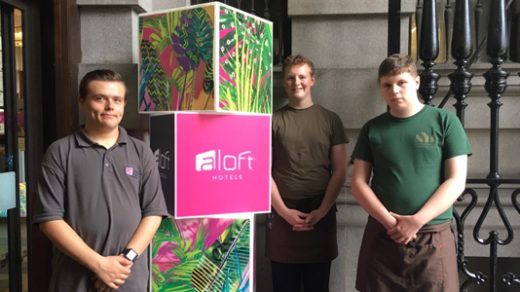Lack of work experience hinders disadvantaged students’ university entry, new report reveals

A new report that was released today has revealed many barriers stop talented young people from securing places at top universities, even if they achieve the required grades.
The report, by social mobility charity Speakers for Schools, concludes young people from disadvantaged backgrounds are held back by a lack of early access to insights and information about the ingredients of successful applications.
Unequal access to work experience and enrichment opportunities are highlighted as barriers for those from disadvantaged backgrounds and favour applicants from wealthier backgrounds.
The report highlights current UCAS guidance, which states work experience and extracurricular activities in personal statements elevate an application beyond high grades. However, Speakers for Schools’ research found that 50% of state students leave school without work experience.
Negative preconceptions are also a challenge for state school students, who are concerned about whether they are likely to get an offer from prestigious universities.
Research by digital platform Zero Gravity found that 24% of state school students need more self-belief to apply to one of the 24 Russell Group universities, which are reputable for their academic achievements, despite meeting the grade requirements.
Evidence highlighted in the report shows:
– The proportion of offers from Russell Group Universities dropped from 60% in 2021 to 55% in 2022, making competition more fierce
– Applications from wealthy areas of the UK are nearly six times more likely to have a prestigious university offer, such as from a Russell Group institution, than those living in a disadvantaged area
– On at least one third of occasions, evidence of work experience and enrichment activities is used to assess university applications
– Half of state school students leave secondary school without having had access to work experience
– 30% of young people attending state schools said they would have welcomed more help from their school or college on how to get into university, compared with just 13% attending independent schools
Speakers for Schools is calling on Russell Group universities to be consistent and transparent about the value of work experience and enrichment activities in applications; the charity said it should be clearly outlined if it positively impacts admission. Speakers for Schools is also calling on the government to adequately fund schools and colleges to provide universal access to high-quality work experience.
Nick Brook, CEO of Speakers for Schools, said: “The United Kingdom is fortunate to be home to some of the highest-ranking universities in the world.
“Admission to these prestigious institutions can carry multiple benefits for a young person and help smooth the path to some highly regarded and lucrative careers.
“With intense competitions for places, it is vital that young people can compete on a level playing field.
“Access to insights, information and support play a crucial role in determining whether a talented young person will apply to a top university, and then succeed in their application.”
The report makes several recommendations, including a call for universally funded work experience for state school students in England, which the charity has been campaigning for since 2022.
Responding to the report, Sarah Hannifin, head of policy at school leaders’ union NAHT, said: “Work-related learning at secondary age is crucial to help pupils to think about their future, while providing them with a valuable taste of the world of work.
“However, despite support for careers education from school leaders, the government removed the requirement to provide work experience and cut the funding schools used to have for this. Schools no longer have the dedicated staff or resources to set up work experience placements for students.
“The success of bringing this requirement back would also depend heavily on a commitment from businesses and employers to host students on work experience.
“All schools must be provided with the resources they need to provide high quality careers education.”
Sarah added that broader careers education should begin at primary school by helping pupils understand how working hard in their education can bring fantastic opportunities in later life.
Speakers for Schools estimates it would cost the government up to £75 million a year to fund, only 0.1% of the annual schools’ budget.
Read the report here.







